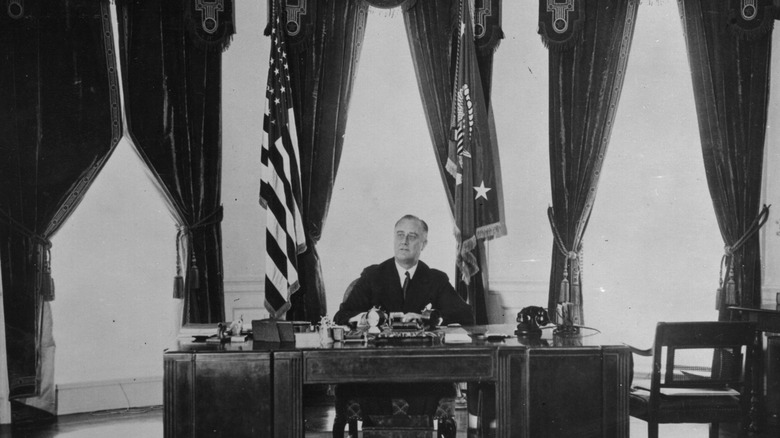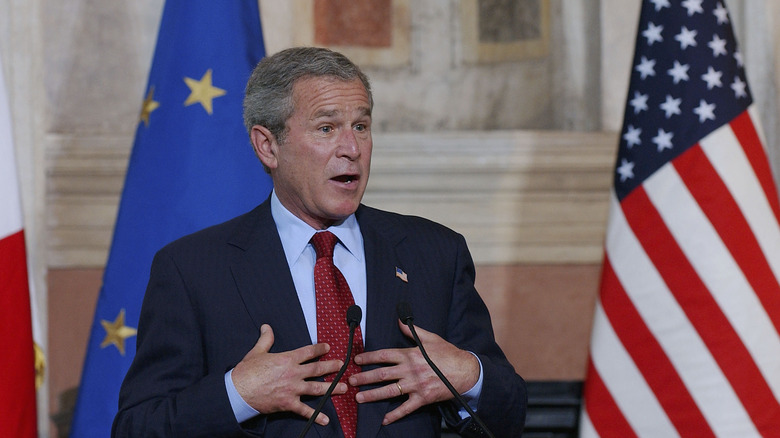Where Did The Phrase Lame Duck Come From?
Most people have heard the term "lame duck" before. But how many people know what it means or where the phrase originates from? According to the Merriam-Webster dictionary, the phrase has two meanings.
First, it's a British expression describing one that lacks the ability to succeed and fails to achieve set goals. In this context, the expression lame duck can represent a business at risk of going under. Eventually, the American financial community began using the phrase lame duck in the 19th century. In the political arena, the phrase "lame duck" refers to an elected official or political party that still holds office between the election and the inauguration of their replacement (via Democracy & Me). So, a politician becomes a lame duck when they near the end of their term in office, and their successor has been elected. Lame-duck status is the case for presidents who have reached their two-term limit or have decided not to run for reelection. Similarly, members of Congress become lame ducks between the November elections and the swearing-in of the New Congress in January. This period is known as a "lame-duck session," which is a transition period between the old guard and the new.
Lame-Duck Congress
According to Study.com, the term lame duck describes outgoing political officials with minimal power and influence compared to when they were first elected. The lame-duck politician's days are numbered, so their agenda becomes less critical than their legacy. Even if a lame-duck president or member of Congress manages to pass new legislation, the incoming lawmakers might reverse any laws passed by the old administration. For example, when Bill Clinton was finishing his second term in 2000-2001, he kept himself on the down-low and didn't make many legislative proposals. Annuitygator.com reported that when Clinton was running out the clock, the stock market dropped by 41%. When George Bush ended his second term in August 2008, the market dropped by 48.4%.
When Congress convenes between an election in November and the inauguration of the new Congress, it's a lame-duck session. Before the Twentieth Amendment was enacted in 1933, Congress would convene during odd-numbered years in December. This system allowed post-election legislators to pass new laws for over a year. The Twentieth Amendment set the new Congress convening date for January 3 of odd-numbered years. The 1933 amendment decreased the lame duck period to two months. Since the Twentieth Amendment, Congress meets in lame-duck sessions solely to deal with unfinished business or emergencies.
Twentieth Amendment game changer
On January 20, 1937, the inauguration of Franklin Delano Roosevelt took place for his second term as president. The inauguration was the first to occur after the Twentieth Amendment passed. The so-called Lame Duck Amendment changed the inauguration date from March 4 to January 20, ending long Congressional lame-duck sessions.
Almost 250 legislators from the first January Congress met in the House Chamber before President Roosevelt's arrival. The House Sergeant at Arms led the members of Congress in procession to the East Portico, where the inaugural stand was set up. Despite heavy rain and bitterly cold temperatures, a large crowd gathered in Washington, D.C., to witness the first January Presidential inauguration. The onlookers watched history made as President Roosevelt and Vice President John Nance Garner were both sworn in on the same platform. Before January 20, 1937, vice presidents took their oath in the Senate Chamber. A historical occasion all around.
Lame-duck perks
Most people generally assume that there are no positive ramifications during the lame-duck period (via Thought Co.) It's true that outgoing politicians wield considerably less power than they once did. Political negotiations are a rough go since the lame-duck has little to offer in return for favors. Departing politicians are old news since their term — and therefore their influence — is ending.
However, there are perks to the lame-duck position as well. Departing politicians are no longer accountable to their constituents, so they can focus on cementing their legacy without worrying about negative feedback or consequences. This short-lived status provides the temporary freedom for the sitting duck to make ill-advised, out-of-character, or even harmful decisions. For example, during his second term in 2007, President George W. Bush increased the number of American troops deployed for the Iraq War, even though he declared the Iraq War was over in 2004.



